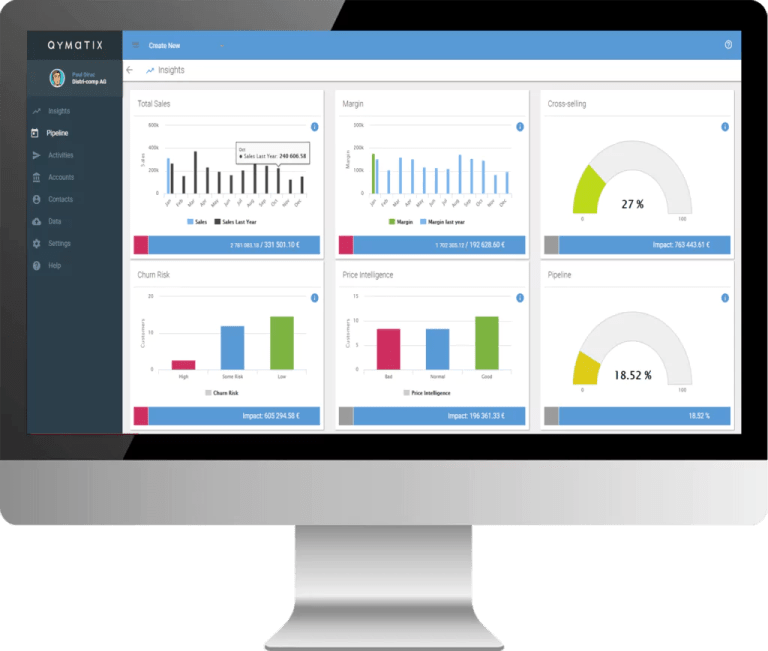Retain Customers with Artificial Intelligence - Churn Prediction
January 27, 2023B2B,Artificial Intelligence,Customer Churn,Sales Forecasting,Predictive AnalyticsPredictive Analytics,Artificial Intelligence,churn,b2b sales,Customer Churn,Predictive Sales Analytics,Machine Learning
Reduce customer churn and attrition with Qymatix Predictive Sales Software.
Artificial Intelligence in SAP R3, ECC and HANA
January 24, 2023Artificial Intelligence,Pricing Analytics,B2BDynamic Pricing,b2b sales,Hyperautomation,Pricing Analytics,Artificial Intelligence
The differences between SAP R3 and S4 HANA - and how SAP automates pricing.
Artificial intelligence (AI) is a rapidly developing field that has the potential to revolutionise B2B sales. One of the companies at the forefront of AI adoption is SAP, a global software corporation that provides enterprise software (ERP) to manage business operations and customer relations.
In this blog post, we will explore the role of AI in SAP's products and services and discuss how the company uses AI to automate pricing and sales analytics.
Read more
KPI Examples: The Key Performance Indicators that every B2B sales manager should use.
January 17, 2023Predictive Sales Analytics,Sales Tips,b2b sales
From lagging and leading Sales KPI to Predictive Analytics. Measure what your sales team is doing to be successful.
Why are sales KPIs so important in B2B? Sales leaders can hardly change the way their customers buy, but they can certainly influence the way their team works. This is accomplished with the help of actionable metrics and key performance indicators.
Five Strategies for Raising Prices in Wholesale
January 10, 2023B2B,Predictive Analytics,Pricing,Pricing Analytics,WholesaleSales Tips,Pricing Analytics,Retail,Wholesale,Predictive Analytics
Wholesale is also affected by global crises such as the Ukraine conflict and the Corona pandemic. On top of that, inflation is on the rise. Manufacturers' and suppliers' prices are rising. What strategies are available to raise prices in turn?
While private consumers are trembling over how high their next gas bill will be or by what factor their monthly gas bill will increase, many companies are already facing rising energy costs.
Read more
The Importance of Recommendation Systems Nowadays
January 3, 2023Predictive Analytics,Sales Forecasting,Cross SellingPredictive Sales Analytics,Algorithms,Cross-Selling
How do recommendation systems work and why are they important for B2B companies?
In recent years, the rapid use of the internet has made it clear that it is the most popular for communication and product purchases. As a result, the amount of available digital information has been increased.
This situation has created the challenge of information overload which hinders timely access to items of interest on the Internet. Although the so-called information retrieval systems, such as Google, are a partial solution, these systems are unable to map available content to user’s interests and preferences.
Read more
Earn Millions of Euros with Dynamic Pricing Analytics
December 27, 2022Pricing,B2B,Artificial Intelligence,Sales Forecasting,Predictive Analytics,Pricing Analyticsb2b sales,Predictive Sales Analytics,Pricing Analytics,Machine Learning
Automate personalisation and pricing processes in B2B using Qymatix B2B Pricing Analytics Software.
Predictive Analytics Blog - The Best of 2022
December 20, 2022B2B,Artificial Intelligence,Predictive AnalyticsPredictive Analytics,Predictive Sales Analytics
The year is coming to an end, and with that, we present you in this post our five most successful blog articles from 2022.
This year, we've also earned our Christmas break, because as John Steinbeck said so well, "The art of resting is part of the art of working."
Artificial intelligence in B2B Sales. New Challenges – New Opportunities.
December 12, 2022Cross Selling,Artificial Intelligence,BI,Sales ForecastingArtificial Intelligence,future of sales,b2b sales
One interesting read about the use of artificial intelligence in B2B sales.
Artificial intelligence (AI) is gaining relevance in Business-to-Business (B2B) sales. Research shows that investment in the development and integration of AI and, in particular, machine learning, technology is continuing to rise.
More money pours today into AI enterprise projects than ever before. Companies should try to avoid vagueness and lack of focus on their aims and expectations, to prevent the costly failure of their AI developments – too often a cause of failure.
Human and/or machine - Why we are afraid of AI: The ELIZA effect.
December 6, 2022AI,Predictive Analytics,Psychology,MachinePredictive Analytics,Machine Learning,Artificial Intelligence
Does your robot vacuum cleaner have a name? Have you ever thought that Alexa has a sense of humour or Siri is having a bad day? And if Google Maps gets it wrong once and directs you right into a traffic jam, is that forgivable because it's a Monday? Or maybe you're just happy to see the friendly ATM that says "Thank you for visiting" and wishes you a nice day? All of this can be summarized under the "ELIZA effect".
In this blog article, we will take a closer look at this phenomenon and evaluate what impact the humanization of AI has on our interaction with this new technology.
Is Germany too Sceptical for Artificial Intelligence in the Workplace?
November 29, 2022Artificial Intelligence,Workplace,B2BJobs,Artificial Intelligence
There is a prejudice that the working world in Germany is mainly fearful and skeptical of a future with artificial intelligence. Is that really a prejudice or a fact?
Are you familiar with the term "German Angst"? It describes the fact that people in Germany are very reserved and sceptical about change. Misgivings often characterize our actions, and since the term is used internationally, this "fear of change" is perceived to be much more pronounced in our nation than in other countries.
The term "German Angst" also comes up again and again in specialist discussions about the development and use of artificial intelligence (AI) in the world of work. There is a prejudice that Germany approaches a future with AI mainly with fear and scepticism. AI visionaries and startups look longingly across the ocean toward the US because its attitudes seem more liberal, innovation-friendly and, not least, more spendy.
Read more










